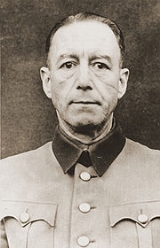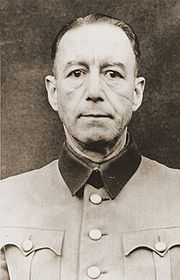
Siegfried Handloser
Encyclopedia

Doctors' Trial
The Doctors' Trial was the first of 12 trials for war crimes that the United States authorities held in their occupation zone in Nuremberg, Germany after the end of World War II. These trials were held before U.S...
in Nuremberg
Nuremberg
Nuremberg[p] is a city in the German state of Bavaria, in the administrative region of Middle Franconia. Situated on the Pegnitz river and the Rhine–Main–Danube Canal, it is located about north of Munich and is Franconia's largest city. The population is 505,664...
- after the main Nuremberg Trials
Nuremberg Trials
The Nuremberg Trials were a series of military tribunals, held by the victorious Allied forces of World War II, most notable for the prosecution of prominent members of the political, military, and economic leadership of the defeated Nazi Germany....
.
Born in Konstanz
Konstanz
Konstanz is a university city with approximately 80,000 inhabitants located at the western end of Lake Constance in the south-west corner of Germany, bordering Switzerland. The city houses the University of Konstanz.-Location:...
he had been a member of the German Army Medical Service since the First World War. In 1938, Handloser was promoted to the position of Army Group physician
Physician
A physician is a health care provider who practices the profession of medicine, which is concerned with promoting, maintaining or restoring human health through the study, diagnosis, and treatment of disease, injury and other physical and mental impairments...
of the Army Group Command 3. In October, 1939, he was named honorary professor.
He had held the position of Chief of the Medical Services of the Armed Forces during World War II
World War II
World War II, or the Second World War , was a global conflict lasting from 1939 to 1945, involving most of the world's nations—including all of the great powers—eventually forming two opposing military alliances: the Allies and the Axis...
. It was the most important medical position in entire German Armed Forces and the Waffen-SS
Waffen-SS
The Waffen-SS was a multi-ethnic and multi-national military force of the Third Reich. It constituted the armed wing of the Schutzstaffel or SS, an organ of the Nazi Party. The Waffen-SS saw action throughout World War II and grew from three regiments to over 38 divisions, and served alongside...
.
Yet despite his full knowledge, he had done nothing to stop medical experiments conducted on concentration camp prisoners
Nazi human experimentation
Nazi human experimentation was a series of medical experiments on large numbers of prisoners by the Nazi German regime in its concentration camps mainly in the early 1940s, during World War II and the Holocaust. Prisoners were coerced into participating: they did not willingly volunteer and there...
, this was sufficient to implicate him in the several medical cases dealt with during the Doctors' Trial.
He was convicted by the American Military Tribunal No. I in August, 1947, and sentenced to life imprisonment. This was later reduced to 20 years and, in 1954, he was released. Shortly afterwards, Handloser died of cancer in Munich
Munich
Munich The city's motto is "" . Before 2006, it was "Weltstadt mit Herz" . Its native name, , is derived from the Old High German Munichen, meaning "by the monks' place". The city's name derives from the monks of the Benedictine order who founded the city; hence the monk depicted on the city's coat...
at the age of 59.

